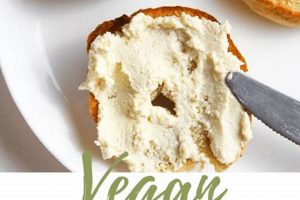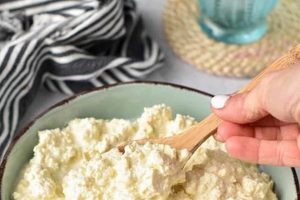The dairy-free alternative offered by Papa John’s is a plant-based substitute designed to replicate the texture and melting properties of traditional mozzarella. This product allows individuals adhering to vegan diets or those with dairy sensitivities to enjoy pizza from the chain without consuming animal products. It’s a specific type of cheese analog formulated for use on their pizzas.
The availability of this option expands Papa John’s menu to a wider consumer base, catering to the growing demand for plant-based choices. Its introduction reflects an awareness of dietary diversity and promotes inclusivity. Historically, major pizza chains primarily offered cheese made from cow’s milk, but this development represents a shift toward accommodating alternative dietary needs.
The following sections will examine the ingredients, nutritional information, availability, and consumer reception of this menu item in greater detail. Analysis will be provided regarding its impact on Papa John’s market position and its role in the broader trend of plant-based food offerings within the fast-food industry.
Enhancing the Papa John’s Dairy-Free Pizza Experience
This section provides guidelines to optimize enjoyment of Papa John’s pizza featuring the plant-based cheese alternative.
Tip 1: Customization is Key. Request specific vegetable toppings to complement the flavor profile. Consider adding ingredients like spinach, mushrooms, onions, or green peppers to enhance the overall taste experience.
Tip 2: Double-Check Preparation. When ordering, confirm with the staff that separate utensils and preparation surfaces are used to prevent cross-contamination with dairy products if such precautions are necessary.
Tip 3: Consider Sauce Choices. While Papa John’s standard pizza sauce is typically vegan-friendly, verify ingredient information. Explore options like garlic sauce as an alternative flavor base.
Tip 4: Optimize Baking Time. Due to differences in melting characteristics compared to traditional dairy cheese, request a slightly longer baking time to ensure the plant-based cheese is fully melted and evenly distributed.
Tip 5: Experiment with Dipping Sauces. Enhance the pizza with compatible dipping sauces. Garlic sauce and some of Papa John’s other sauces may provide a complementary flavor.
Tip 6: Inquire About Nutritional Information. Obtain detailed nutritional information regarding the plant-based cheese and other ingredients from Papa Johns website or customer service to align with dietary requirements.
Tip 7: Provide Feedback. Share experiences with Papa John’s management to contribute to ongoing product refinement and service improvements related to plant-based options.
Following these recommendations aims to maximize satisfaction when ordering Papa John’s pizza with the dairy-free cheese alternative. Attention to customization, preparation details, and complementary flavors contributes to a positive dining experience.
The subsequent sections will address common consumer queries and concerns regarding the plant-based option at Papa John’s.
1. Plant-based Alternative
The selection of a plant-based alternative by Papa John’s for its dairy-free cheese offering signifies a strategic decision to cater to evolving consumer preferences and dietary needs. This move reflects a growing awareness of veganism, lactose intolerance, and the environmental impact associated with traditional dairy production.
- Ingredient Sourcing and Composition
The formulation of the plant-based alternative involves careful selection of non-animal-derived ingredients designed to replicate the taste and texture of conventional mozzarella. Common ingredients may include modified food starch, coconut oil, and various plant proteins. The sourcing of these components directly impacts the product’s sustainability and nutritional profile.
- Melting Properties and Application
A critical aspect of the plant-based alternative is its ability to melt and brown similarly to dairy cheese under high temperatures. Achieving this requires precise control over the ingredient ratios and manufacturing processes. The success of the plant-based cheese in mimicking these properties is vital for consumer acceptance and overall pizza quality.
- Nutritional Considerations
Plant-based cheese alternatives often exhibit differing nutritional profiles compared to traditional dairy cheese. Factors such as protein content, fat composition, and the presence of added vitamins and minerals must be carefully considered. Nutritional labeling provides consumers with the information needed to make informed dietary choices.
- Market Positioning and Consumer Perception
The availability of a plant-based alternative allows Papa John’s to broaden its market reach and appeal to a wider demographic. Consumer perception of the product is influenced by factors such as taste, texture, price, and brand reputation. Positive reviews and endorsements can significantly drive sales and brand loyalty.
The incorporation of a plant-based alternative into Papa John’s menu demonstrates a commitment to innovation and responsiveness to consumer demand. The success of this offering depends on a combination of factors, including the quality of the ingredients, the effectiveness of the formulation, and the clarity of communication regarding its nutritional and ethical attributes.
2. Dairy-free formulation
The core attribute defining the dairy-free formulation in Papa John’s plant-based cheese alternative is the complete absence of animal-derived milk products. This exclusion necessitates the utilization of plant-based fats, proteins, and starches to emulate the texture, melt, and flavor profile of conventional mozzarella. For individuals with lactose intolerance, milk allergies, or those adhering to a vegan diet, this characteristic makes Papa John’s offering a viable option, expanding the consumer base for the pizza chain. The formulation directly affects ingredient sourcing, manufacturing processes, and the final nutritional composition of the product.
The implications of a dairy-free formulation extend beyond simple dietary accommodation. It requires careful consideration of alternative ingredients, such as modified food starch, coconut oil, and plant-derived proteins. These substitutes impact not only the sensory properties of the cheese but also its functionality during the pizza baking process. For example, achieving a satisfactory melt without dairy proteins necessitates a precise balance of ingredients and controlled oven temperatures. Any deviation can result in a product that lacks the desired texture and appearance, potentially affecting consumer satisfaction.
In summary, the dairy-free formulation is the foundational element upon which Papa John’s vegan cheese alternative is built. Its successful execution is critical for providing a product that meets the dietary needs of specific consumer groups while maintaining acceptable taste and textural qualities. Ongoing research and development in plant-based food technologies will likely further refine these formulations, improving both the consumer experience and the nutritional value of dairy-free alternatives.
3. Melting Characteristics
The melting characteristics of Papa John’s vegan cheese are a critical factor influencing consumer acceptance and overall product quality. Unlike traditional dairy-based mozzarella, plant-based cheese alternatives present unique challenges in replicating the desired melt, stretch, and browning properties essential to pizza enjoyment. The formulation and processing methods directly impact these characteristics.
- Ingredient Composition and its Impact on Melting Point
The primary components of Papa John’s vegan cheese, such as modified food starches, vegetable oils (e.g., coconut oil), and plant-based proteins, dictate its melting behavior. The specific ratios and types of these ingredients affect the melting point and the uniformity of the melt. Higher concentrations of saturated fats from coconut oil, for example, can influence the cheese’s ability to soften at pizza baking temperatures.
- Emulsification and Fat Distribution
Achieving a smooth, even melt requires effective emulsification of the fat and water components within the vegan cheese. Poor emulsification can result in separated oils and an undesirable texture. Emulsifiers derived from plant sources, such as sunflower lecithin, are utilized to stabilize the mixture and promote a cohesive melt. The distribution of fat particles significantly impacts the cheese’s ability to uniformly soften when heated.
- Water Content and Hydration
The water content of the vegan cheese influences its hydration properties during baking. Insufficient moisture can lead to a dry, crumbly texture, while excessive moisture may result in a soggy or oily outcome. The controlled hydration of starches and proteins is crucial for achieving the desired elasticity and viscosity of the melted cheese.
- Browning and Maillard Reaction
Traditional mozzarella develops a characteristic browning due to the Maillard reaction, a chemical reaction between amino acids and reducing sugars. Replicating this browning effect in vegan cheese alternatives requires the inclusion of specific ingredients that can undergo similar reactions. The addition of reducing sugars or controlled enzymatic treatments can promote browning and enhance the visual appeal of the final product.
The successful replication of desirable melting characteristics in Papa John’s vegan cheese is essential for satisfying consumer expectations and ensuring a palatable pizza experience. Continuous research and development in plant-based cheese formulations are vital for optimizing these properties and improving the overall quality of dairy-free alternatives.
4. Ingredient Composition
The ingredient composition of Papa John’s vegan cheese is the foundational determinant of its suitability as a dairy-free alternative, directly influencing its texture, flavor, melting properties, and nutritional profile. Understanding this composition is essential for consumers with specific dietary needs or preferences.
- Base Ingredients and Their Functional Roles
The primary ingredients typically include a combination of modified food starch, refined vegetable oils (often coconut oil), and plant-based proteins. The modified food starch contributes to the cheese’s structure and texture, while the vegetable oil provides fat content to mimic the richness of dairy cheese. Plant-based proteins, such as those derived from soy or peas, may be added to improve the protein content and overall nutritional value. Each ingredient plays a specific role in replicating the sensory attributes of traditional mozzarella.
- Emulsifiers and Stabilizers: Ensuring Uniformity
Emulsifiers, such as sunflower lecithin, are necessary to stabilize the mixture of oil and water-based components, preventing separation and ensuring a smooth, consistent texture. Stabilizers, such as carrageenan or xanthan gum, may also be included to maintain the cheese’s structure and prevent it from becoming grainy or watery during melting. These additives are crucial for achieving a product that performs consistently during baking.
- Flavor Enhancers and Seasonings: Replicating Dairy Flavor
Given the absence of dairy-derived flavor compounds, vegan cheese formulations often incorporate flavor enhancers and seasonings to mimic the characteristic taste of mozzarella. These may include natural or artificial flavorings, lactic acid, or nutritional yeast, each contributing to a more savory and umami-rich profile. The specific blend of flavorings is carefully calibrated to create a palatable and appealing product.
- Nutritional Considerations and Allergen Information
The ingredient composition directly dictates the nutritional profile of Papa John’s vegan cheese, influencing its fat, protein, carbohydrate, and micronutrient content. Consumers with allergies or sensitivities should carefully review the ingredient list to identify potential allergens, such as soy or nuts, which may be present in certain formulations. Nutritional information provides critical data for informed dietary choices.
The interplay of these ingredients ultimately determines the success of Papa John’s vegan cheese as a dairy-free alternative. While it offers a viable option for individuals avoiding dairy, understanding its specific composition allows consumers to make informed decisions based on their individual preferences and requirements.
5. Consumer Availability
The extent to which Papa John’s vegan cheese is readily available to consumers directly impacts its success as a menu offering and its contribution to the company’s market share. Limited availability restricts its potential customer base, while widespread distribution enhances accessibility and caters to the growing demand for plant-based options. Geographic location, menu integration, and promotional efforts influence this availability. For instance, if a specific Papa John’s location does not stock the vegan cheese or only offers it as a limited-time promotional item, consumer access is significantly restricted, potentially leading to customer dissatisfaction and a perception of Papa John’s as not fully committed to plant-based alternatives.
Menu placement and online ordering interfaces play a critical role in communicating the availability of the vegan cheese option. If the item is buried within a complex customization menu or not clearly highlighted on the main menu, customers may be unaware of its existence, effectively limiting its accessibility. Similarly, inconsistencies in availability across different ordering platforms (e.g., website vs. mobile app) can create confusion and hinder consumer access. Conversely, prominent placement on the menu, clear labeling, and dedicated promotional campaigns showcasing the vegan cheese option can significantly increase its visibility and drive sales. Consider the example of a Papa John’s franchisee who actively promotes the vegan cheese option through social media and local events. This proactive approach enhances consumer awareness and, consequently, increases order volume.
In conclusion, consumer availability is not merely a logistical consideration but a strategic imperative for Papa John’s vegan cheese. Enhanced availability, driven by thoughtful menu integration, targeted marketing, and consistent stocking practices, translates to greater consumer awareness, increased sales, and a stronger brand image as a provider of inclusive and diverse dining options. The challenges associated with inconsistent availability underscore the need for a standardized approach to ensure that all customers, regardless of location, have ready access to the plant-based cheese alternative.
Frequently Asked Questions Regarding Papa John’s Vegan Cheese
This section addresses common inquiries concerning Papa John’s dairy-free cheese alternative. The information provided aims to clarify its composition, availability, and suitability for various dietary requirements.
Question 1: What ingredients comprise Papa John’s vegan cheese?
Papa John’s vegan cheese typically consists of a blend of modified food starch, vegetable oil (often coconut oil), and plant-based proteins. Specific ingredient lists may vary depending on the supplier and formulation. Consumers are advised to review ingredient information on the Papa John’s website or contact customer service for detailed information.
Question 2: Is Papa John’s vegan cheese suitable for individuals with allergies?
Individuals with allergies should carefully review the ingredient list before consuming Papa John’s vegan cheese. Potential allergens may include soy, nuts, or other plant-derived substances. Cross-contamination during food preparation is also a possibility. Those with severe allergies should exercise caution and inquire about preparation practices at the specific Papa John’s location.
Question 3: Does Papa John’s vegan cheese melt like traditional mozzarella?
While formulated to mimic the melting properties of dairy mozzarella, Papa John’s vegan cheese may exhibit differences in melting behavior. Variations in texture, stretch, and browning can occur due to the absence of dairy proteins. Baking time may need adjustment to achieve optimal melting.
Question 4: Is Papa John’s vegan cheese available at all locations?
The availability of Papa John’s vegan cheese may vary depending on the specific location. It is recommended to check with the local Papa John’s restaurant to confirm availability before placing an order. Some locations may offer it as a standard menu item, while others may only provide it as a limited-time option.
Question 5: How does the nutritional content of Papa John’s vegan cheese compare to traditional mozzarella?
Papa John’s vegan cheese typically has a different nutritional profile compared to traditional mozzarella. Variations exist in fat content, protein levels, and the presence of certain vitamins and minerals. Consumers should consult the nutritional information provided by Papa John’s to make informed dietary choices.
Question 6: Is Papa John’s pizza sauce vegan?
The standard pizza sauce used by Papa John’s is generally considered vegan. However, ingredients can change, and variations may exist across different regions. It is advisable to confirm the vegan status of the pizza sauce directly with the Papa John’s location or by reviewing the ingredient information online.
In summary, Papa John’s vegan cheese offers a dairy-free alternative for consumers seeking plant-based options. Awareness of its composition, availability, and potential allergens is crucial for making informed decisions.
The next section will provide consumer reviews and testimonials regarding Papa John’s vegan cheese.
Papa Johns Vegan Cheese
This exploration of Papa Johns vegan cheese has underscored its role as a significant menu addition catering to evolving dietary preferences. Key aspects, including ingredient composition, melting characteristics, and consumer availability, directly impact its success and acceptance within the plant-based market. Formulations are not static, and ongoing refinement is essential to meet consumer expectations regarding taste, texture, and nutritional value. Furthermore, consistent and transparent communication regarding ingredients and allergen information is critical for fostering consumer trust.
Ultimately, the future of Papa Johns vegan cheese hinges on its ability to adapt to changing consumer demands and maintain a commitment to quality and accessibility. Continued investment in research and development, coupled with proactive engagement with consumer feedback, will determine its long-term viability as a competitive offering within the fast-food landscape. Further observation and analysis will be required to fully assess its influence on the market and its impact on consumer dietary choices.







